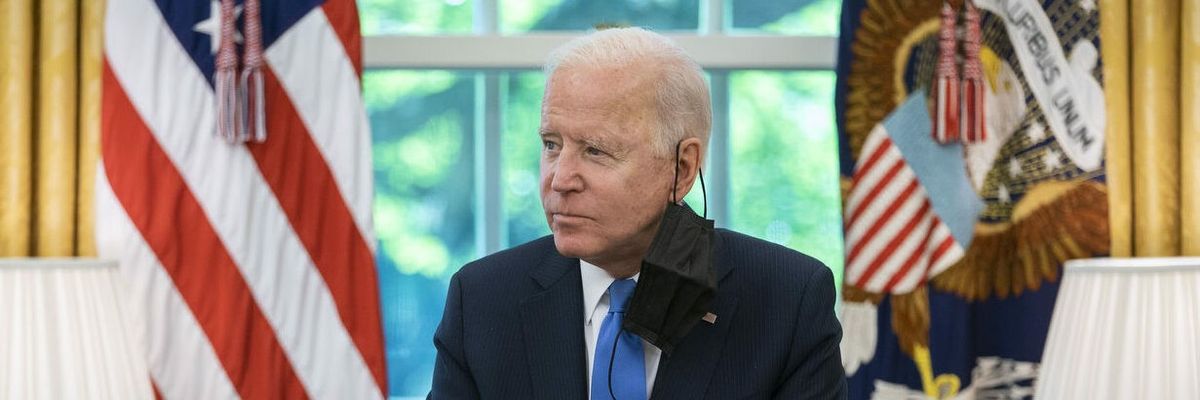Writing in the New York Times, veteran foreign correspondent Edward Wong reports that the Biden “administration’s approach to strategic priorities is surprisingly consistent with the policies of the Trump administration.”
What ought to be surprising at this juncture is Wong’s surprise.
Its source? It derives from the bizarre notion that when it comes to foreign policy, the President of the United States, commonly referred to as the “most powerful man in the world,” is a free agent who wields quasi-imperial authority. Going at least as far back as the days when Franklin Roosevelt occupied the Oval Office, this has been a staple of American politics, relentlessly promoted by the media. On the global stage, the U.S. president is an unrivaled kingpin.
Candidates for the presidency routinely play along with this conceit. If elected, they promise that Big Change will follow in short order. When Donald Trump vowed in his Inaugural Address that "This American carnage stops right here and stops right now,” his choice of vocabulary may have raised eyebrows, but the basic sentiment was supremely presidential. The nature of the carnage to which he referred was (to put it politely) hazy. But as president he was willing it to cease and so it would.
But it did not. Nor did the Big Change promised by his several immediate predecessors or by his successor occur. Especially in matters related to America’s role in the world, the status quo has proven stubbornly persistent.
In practice, the power wielded by the most powerful man in the world turns out to be quite limited. Factors at home and abroad constrain presidential freedom of action. True, POTUS flies around the world in a very big airplane and everyone stands up when he enters the room, but as a practical matter presidential authority is circumscribed.
Should there be any doubt on that score, consider the Manchin Effect: a single sitting U.S. Senator — of the president’s own party, no less — making mincemeat of the current president’s domestic agenda. And foreign capitals are filled with Manchin clones who delight in complicating, obstructing, and otherwise frustrating the will of the U.S. president.
Sometimes it’s subtle — a fist bump, say, as a way to mend fences with the Crown Prince of Saudi Arabia. Sometimes it’s overt and gratuitous: Remember the delight that Benjamin Netanyahu took in humiliating President Barack Obama during the Israeli prime minister’s appearance before Congress in 2015? It turns out to be not all that difficult to get away with scoring points at the expense of an American president.
The truth is that the press pays way, way too much to presidential promises of Big Change. Indeed, Trump himself offers the best example of overpromising. He was going to end America’s endless wars in the Middle East and “take” the oil. He was going to pull the United States out of NATO. He was going to “build a wall” and thereby solve the border security problem once and for all. None of these happened.
It's important to recognize why he fell short in each instance — and why Biden’s efforts to change course are likewise doomed to fail. Two factors stand out, one structural and the other ideological.
The structural factor refers to the institutions whose wellbeing is dependent upon maintaining arrangements that devolved during the Cold War and survived the Cold War’s passing. Call it what you will — the Blob, the Deep State, the military-industrial-congressional complex — it exercises a de facto veto power on all matters related to basic U.S. national security policy.
Here’s an illustration of how it works in practice: A 20-year long U.S. war in Afghanistan ends in abject failure. The Congress responds the following year by increasing the size of the Pentagon budget, with large bipartisan majorities approving. In the executive suites of the MIC and in the E-Ring of the Pentagon, champagne corks pop.
The ideological factor rests on explicit or tacit claims of American Exceptionalism: That it is incumbent upon the United States to lead the world, with leadership tending in practice to become a synonym for global primacy and primacy tending to be expressed in military terms. Such expectations are wildly at odds with the emerging reality of multi-polarity and with a growing agenda of common problems such as the climate crisis to which military power is irrelevant.
Thirty years after the end of the Cold War it becomes increasingly evident that the United States has squandered the position of global dominion that was seemingly ours in 1989. That we need to do things differently is self-evidently the case. But don’t expect solutions to come from the Oval Office. The U.S. president is as much a captive of circumstance as he is an agent of Big Change.














